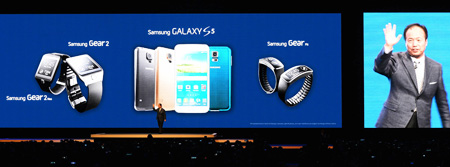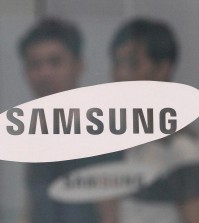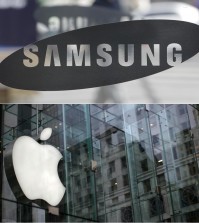- California Assembly OKs highest minimum wage in nation
- S. Korea unveils first graphic cigarette warnings
- US joins with South Korea, Japan in bid to deter North Korea
- LPGA golfer Chun In-gee finally back in action
- S. Korea won’t be top seed in final World Cup qualification round
- US men’s soccer misses 2nd straight Olympics
- US back on track in qualifying with 4-0 win over Guatemala
- High-intensity workout injuries spawn cottage industry
- CDC expands range of Zika mosquitoes into parts of Northeast
- Who knew? ‘The Walking Dead’ is helping families connect
Samsung unveils upgraded Galaxy
S5 armed with fingerprint scanner, heart-rate sensor

Shin Jong-kyun, president and CEO of Samsung Electronics’ IT and Mobile Communications Division, gives a presentation on the flagship Galaxy S5 smartphone at the Mobile World Congress in Barcelona, Tuesday. Samsung unveiled the Gear Fit, a fitness band, Sunday, in a move to strengthen its presence in the wearable devices market. (Courtesy of Samsung Electronics)
By Choi Kyong-ae
BARCELONA ― Samsung Electronics Monday unveiled its latest Galaxy S5 smartphone equipped with a larger screen and fingerprint scanner.
At the “Unpacked 5” event held at the Mobile World Congress here on Monday, the Korean technology giant introduced the new flagship phone which focuses on basic features such as photo-taking, download speeds and battery life.
It comes with a 5.1-inch display, wider than the 4.99 inches of its predecessor, the Galaxy S4. Features such as waterproof and dust-resistant capabilities and a fingerprint scanner are newly added to the latest model.
Analysts say the lack of wow factors may disappoint some consumers because top-tier players such as Samsung and Apple have surprised the world with bold innovations in their flagship phones.
How the new phone is taken by the market will determine Samsung’s future earnings growth in an ever-saturating smartphone market.
Samsung’s decision to adopt a fingerprint scanner in the Galaxy S5 was hailed by some participants at the event. But others said they were not impressed by the “familiar” technology as they expected something more dramatic from it.
Apple already introduced the finger-scanning function in its iPhone 5S last year. The technology allows users to unlock their phones with the press of a finger.
“Innovative features do not mean everything … but I expected bold features such as an iris scanner,” a project development manager at Inatel, Brazil’s state-run telecom institute, told The Korea Times on the sidelines of the annual trade show, which lasts through Feb. 27.
However, Samsung went practical this time with the new phone given what its mobile chief said during the event. Samsung apparently came up with a streamlined product by eliminating some flashy but little-used functions.
“People are easily excited about the newest and latest technology, and we are working on that too. But our philosophy is to listen to consumers,” said Shin Jong-kyun, president and CEO of Samsung’s IT and Mobile Communications Division.
“What we have learned is surprisingly simple in this ever-changing industry. We can only succeed when consumers choose us. Our consumers want durable design and performance, yet powerful cameras, faster and seamless connectivity and to stay fit,” he said.
To meet the demands, Samsung has improved camera functions, enhanced wireless capabilities and bolstered fitness- and health-related apps in the Galaxy S5.
The new smartphone comes with a 16-megapixel camera which enables a user to take a picture in 0.3 seconds, as well as other functions available on the digital SLR cameras favored by professional photographers.
The “download booster” function linked with the Long-Term Evolution and Wi-Fi services will help boost download speeds by nearly five times. And the Galaxy S5 has a heart-rate sensor, the first of its kind for a smartphone, for a regular checkup by the user.
Last but not the least, Samsung introduced Gear Fit to take the lead in the wearable devices market. The fitness band came on the heels of the release of the Gear 2 and Gear 2 Neo. The two computerized wristwatches are powered by the Tizen operating system being developed by Samsung and its partners to challenge the dominance by Apple’s iOS and Google’s Android. All Samsung phones run on Android.
Still, wearable devices won’t likely to be an immediate growth driver for Samsung though Apple and Google are expected to join the wearables market later this year. Sony is also a leading player in wearables. Another worry for Samsung is cheaper smartphones offered by Chinese competitors.
Given everything, betting big on the Galaxy S5 does make sense for Samsung. It remains to be seen whether the new product will help boost slowing smartphone sales.
Samsung sold 320 million smartphones last year, followed by Apple’s 153 million units and Sony’s 38 million units, according to Strategy Analytics.
















